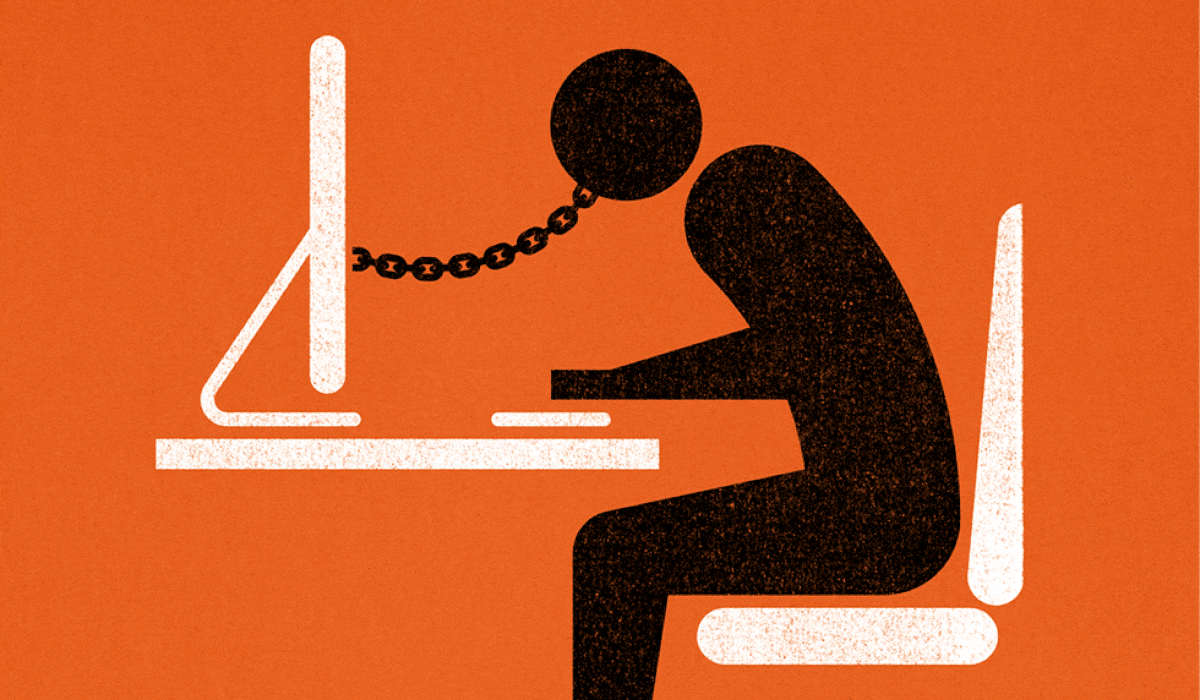You don't suddenly realize it.
It is a process that gradually envelops you.
It begins with confusion, you do not know what is wrong with you, why it is difficult for you to get up or why you do not feel like going to work.
You can't rest at night, because your head gets tangled up with work problems.
You start to be pessimistic.
You see things worse than they really are and problems arise when they were just incidents before.
All of this makes you in a bad mood and you pay for it with those around you.
Little by little, you isolate yourself, your personal self-esteem falls to the ground and you begin to doubt even your own professional abilities ”.
With these words, a person affected by the syndrome of the burned worker or
burnout
, as it is known in English,
explains
the process he goes through. The World Health Organization defined it in 2019 as chronic stress in the workplace with three clear consequences: a feeling of deep exhaustion, a negative attitude towards work and a reduction in professional effectiveness. Covid-19 has accentuated these symptoms. "We have felt more vulnerable due to events and we are more prone to burn out in our work," reflects Antonio Pamos, doctor in Psychology and professor at the Camilo José Cela University.
The
burnout
is not a single problem of who suffers, but the organization and society as a whole. According to Jennifer Moss, author of the book
The Burnout Epidemic
, the consequences of this syndrome involve the loss of a trillion dollars in annual productivity worldwide, a cost of 190,000 million in medical care and the death of 120,000 people a year just in United States because of exhaustion. We are talking about a really serious problem that damages many people, that transcends the workplace and that affects not only those who work within an organization, but also other types of professionals, such as freelancers or entrepreneurs. Even family and friends who live with someone who is burned.
To remedy this, both organizations and those affected themselves must take action. “Falling into this syndrome takes time; get out, too. In some cases we need to rely on specialists and in others we can self-regulate if we act at different levels: physiological, emotional and mental ”, explains Pamos.
The first step is to recognize that we are burned out. We can all suffer from this syndrome, but it seems that there are more prone people. Those who are vocational or highly dedicated may suffer the consequences more intensely. This is the case with teachers, nurses or professionals in the world of NGOs. According to research by Sharon Maylor of Walden University, some character traits make us more vulnerable to
burnout
. Perfectionists, introverts, or those who are highly analytical, more sensitive to possible risks, not very impulsive, or take too much responsibility for what happens are more likely to suffer from it. Therefore, if we want to reduce the impact of
burnout
in our life, we need to improve our self-knowledge; that is, learn to identify what happens to us.
One of the levels to work on is physiological. "We should try to eliminate anxiety through relaxation techniques, improve breathing or
mindfulness
, for example," says Pamos. Taking time to take care of yourself is important to do so, as research has shown. According to the analysis conducted by Yu Tse Heng and Kira Schabram of the University of Washington, people who spent 10 minutes a day taking care of themselves, using relaxation techniques, cooking healthy food, or even taking a nap, reduced their perception of exhaustion the next day. In addition, practicing compassion towards others was able to reduce the cynicism derived from
burnout
.
Another symptom of this syndrome is the perception of isolation. The way to avoid it is to act on the emotional level; That is, to open up to new conversations with loved ones, ask for help to get out of the mental loop in which we find ourselves and remember how we were before we found ourselves like this. Not to awaken nostalgia, but to understand that it is a temporary state, not something inherent to us. That we can go out. As someone who suffered
burnout
recognizes
, "you yourself become toxic because you are sick and you surround yourself with equally toxic people, who complain about everything that happens." The goal is to know how to say no to such relationships and begin to surround yourself with more positive people, with kinder conversations.
Finally, the mental level is about broadening our personal perspective.
It is true that we spend many hours dedicated to work, but work is only a part of ourselves.
Valuing what we already have, such as our family, health or friends, helps us to relativize and put work problems and associated burnout in the right place.
Obviously, reaching this attitude takes time.
Sometimes outside help is needed, at other times, making decisions, such as changing jobs or friends, but the important thing is to act to get out of that exhaustion for yourself and for the people who love us.
Sign in to continue reading
Just by having an account you can read this article, it's free
Sign upLogin
Thanks for reading EL PAÍS

